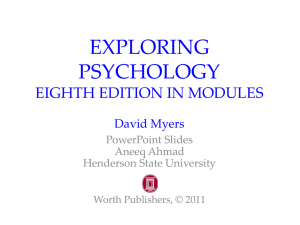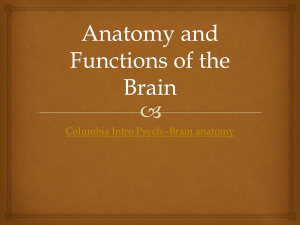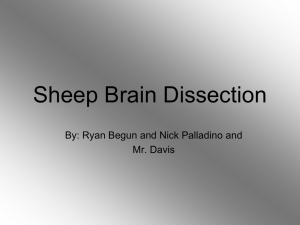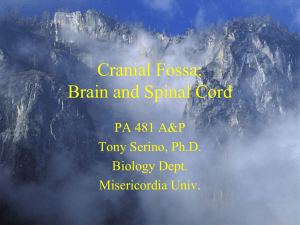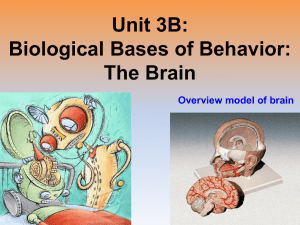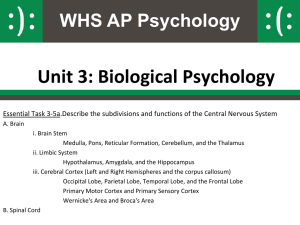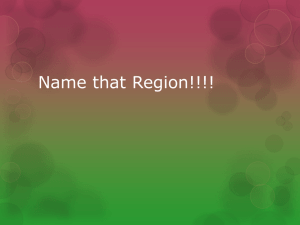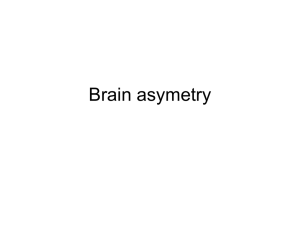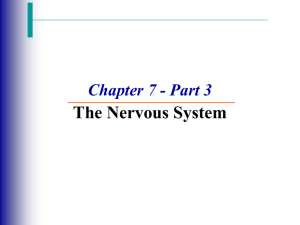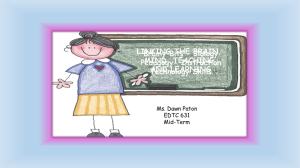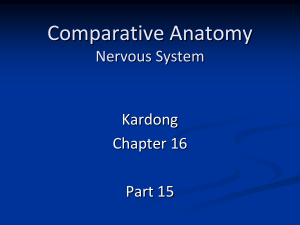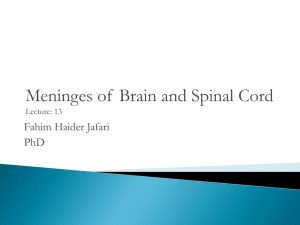Notes: Brain Parts and Functions (ppt)
advertisement
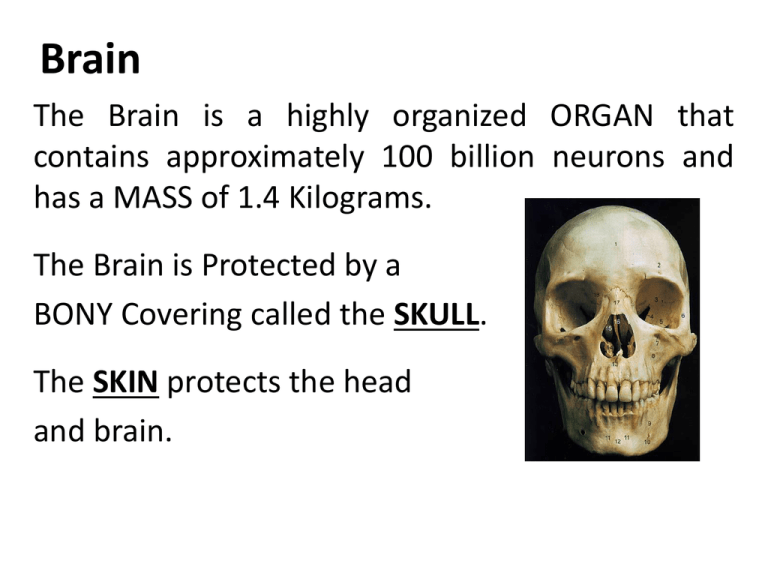
Brain The Brain is a highly organized ORGAN that contains approximately 100 billion neurons and has a MASS of 1.4 Kilograms. The Brain is Protected by a BONY Covering called the SKULL. The SKIN protects the head and brain. Brain • In order for the Brain to perform its functions, it must have a constant supply of Food and Oxygen. • If the Oxygen supply to the brain is cut off even for a few minutes, the brain will usually suffer enormous damage. Such damage may result in DEATH. Meninges: Dura Mater, Arachnoid Mater, Pia Mater The Brain is WRAPPED in THREE LAYERS of CONNECTIVE TISSUE known as the MENINGES: 1. DURA MATER The OUTER Layer is composed of Thick Connective Tissue. 2. ARACHNOID MATER The THIN, elastic, web-like layer between the DURA MATER and the PIA MATER. 3. PIA MATER The INNER-most layer, which covers and is bound to the surface of the brain. It is a FIBROUS LAYER made up of many Blood Vessels which carry FOOD and OXYGEN to the Brain. Meninges: Dura Mater, Arachnoid Mater, Pia Mater • The meninges are tough layers of tissue which help protect the brain. • Cerebrospinal Fluid (CSF) fills space between the meninges. This provides a protective “cushion” for the brain. Meninges: Dura Mater, Arachnoid Mater, Pia Mater Meninges: Dura Mater, Arachnoid Mater, Pia Mater Skull Dura mater Arachnoid Layer Pia Mater Brain Cerebrum Cerebrum • • THE CONTROL CENTER OF THE BRAIN. The LARGEST and most PROMINENT part of the Human Brain. 85% of the weight of a human brain. The Cerebrum takes up most of the space in the cavity that houses the Brain (the skull). • Responsible for all the VOLUNTARY (CONSCIOUS) ACTIVITIES OF THE BODY. It is the site of INTELLIGENCE, LEARNING AND JUDGMENT. • The CEREBRUM is divided into TWO HEMISPHERES: THE LEFT AND RIGHT CEREBRAL HEMISPHERES. • FUNCTIONS: Speech/Language, Conscious Thought, Memory, Personality, Vision, Logic and Emotions, Voluntary Movement, Interpretation of Sensation, and other sensations. The Cerebrum and Cerebral Cortex Cerebral Cortex The cerebrum’s surface - the cerebral cortex - is convoluted into hundreds of folds made of gyri (singular gyrus) and sulci (singular sulcus). The cerebral cortex is where all the higher brain functions take place. The Cerebral Cortex The Cerebral Cortex • Folds in the cerebral cortex increase the surface area of the brain. • What does this tell you about the importance of the tissue in the cerebral cortex? The Cerebral Cortex The cerebral cortex is a thin layer of cells about 1.5 to 4 mm thick. The cortex provides the connections and pathways for the highest cognitive functions, such as language and abstract thinking. The cerebral cortex contains about 25 billion neurons, more than 62,000 miles of axons, and 300,000,000,000,000 synapses. Cerebral Cortex The thin layer of the cerebral cortex is dense with neurons. The Cerebrum The Corpus Callosum is the fibrous tract of white matter that connects the right and left cerebral hemispheres. The cerebrum is often divided into five lobes that are responsible for different brain functions. 1. frontal lobe 2. temporal lobe 3. parietal lobe 4. occipital lobe 5. limbic lobe Corpus callosum The Cerebrum • Different parts of the brain have different functions. • Often, several parts or regions coordinate (work together) to perform specific functions, such as speaking. Lobes of the Cerebrum Frontal Lobe Parietal Lobe Occipital Lobe Temporal Lobe Limbic Lobe Frontal Lobe Contains the Primary Motor Cortex (controls voluntary movements of specific body parts). Area of the brain responsible for higher cognitive functions. These include: • • • • • • • • Problem solving Spontaneity Memory Language Motivation Judgment Impulse control Social and sexual behavior Temporal Lobe The temporal lobe plays a role in emotions, and is also responsible for smelling, tasting, perception, memory, understanding music, aggressiveness, and sexual behavior. The temporal lobe is also involved in language. Parietal Lobe The parietal lobe plays a role in our sensations of touch, smell, and taste. It also processes sensory and spatial awareness, and is a key component in eye-hand coordination and arm movement. The parietal lobe also contains a specialized area called Wernicke’s area that is responsible for matching written words with the sound of spoken speech. Occipital Lobe The occipital lobe is at the rear of the brain. It controls: • vision • recognition Limbic Lobe The limbic lobe is located deep in the brain, and makes up the limbic system. Functions: • regulates emotion and memory • connects the lower and higher brain functions The Limbic System A. B. C. D. E. F. Cingulate gyrus Fornix Anterior thalamic nuclei Hypothalamus Amygdaloid nucleus Hippocampus Cerebellum The cerebellum is connected to the brainstem. Functions: • “autopilot” for body movement and balance. The Ventricles • a complex series of spaces and tunnels through the center of the brain • secrete cerebrospinal fluid (CSF), which suspends and protects the brain in the skull. • provide a route for “chemical messengers” that are widely distributed through the central nervous system. The Ventricles **Cerebrospinal Fluid (CSF) circulates from Lateral Ventricles into Third Ventricle and through the cerebral aqueduct into the Fourth Ventricle. The Ventricles and Cerebrospinal Fluid The Cerebrospinal Fluid (CSF) is a clear liquid that PROTECTS the Brain from mechanical injury by acting as a Shock Absorber. **CSF fills space in the meninges and fills four interconnected VENTRICLES, or cavities in the brain. Within the Ventricles, CSF acts as a Transport Medium for substances that are important to Brain Function. **Cerebrospinal Fluid (CSF) circulates from Lateral Ventricles into Third Ventricle and through the cerebral aqueduct into the Fourth Ventricle. Cerebrospinal Fluid (CSF) Cerebrospinal fluid is a colorless liquid that bathes the brain and spine. It is formed within the ventricles of the brain, and it circulates throughout the central nervous system. Cerebrospinal fluid fills the ventricles and meninges, allowing the brain to “float” within the skull. Diencephalon and Brainstem Diencephalon and Brainstem Diencephalon = Thalamus + Hypothalamus + 3rd Ventricle Diencephalon = Thalamus + Hypothalamus + 3rd Ventricle Diencephalon = Thalamus + Hypothalamus + 3rd Ventricle Diencephalon = Thalamus + Hypothalamus + 3rd Ventricle Diencephalon = Thalamus + Hypothalamus + 3rd Ventricle Diencephalon = Thalamus + Hypothalamus + 3rd Ventricle Thalamus Thalamus means “inner room” in Greek, as it sits deep in the brain at the top of the brainstem. The thalamus is called the gateway to the cerebral cortex, as nearly all sensory inputs pass through it to the higher levels of the brain. • Relays sensory and motor signals to cerebral cortex. • Regulates sleep, consciousness, alertness Hypothalamus The hypothalamus sits under the thalamus at the top of the brainstem. Although the hypothalamus is small, it controls many critical bodily functions: • Controls autonomic nervous system • Center for emotional response and behavior • Regulates body temperature • Regulates food intake • Regulates water balance and thirst • Controls sleep-wake cycles • Controls endocrine system The hypothalamus is shaded blue. The pituitary gland extends from the hypothalamus. Brainstem: 3 Divisions Midbrain Pons Medulla Oblongata The Brainstem The most primitive part of the brain. Controls the basic functions of life: • autonomic survival behaviors • breathing • heart rate • swallowing • reflexes to sight or sound • sweating • blood pressure • sleep • balance The Midbrain (mesencephalon) Midbrain Pons Small portion at superior end of brainstem. Holds cerebral aqueduct which connects the 3rd and 4th Ventricles. Associated with • vision • hearing • motor control • sleep/wake/arousal (alertness) • temperature regulation Medulla Oblongata The Pons The rounded brainstem region between the midbrain and the medulla oblongata. In fact, pons means “bridge” in Latin. Main functions: • to connect the cerebellum to the rest of the brain • to modify the respiratory output of the medulla (to control breathing). The origin of several cranial nerves. The Medulla Oblongata The medulla oblongata merges seamlessly with the spinal cord and creates the base of the brainstem. The medulla is also the origin of many cranial nerves. The medulla is primarily a control center for vital involuntary reflexes such as: • swallowing • vomiting • sneezing • coughing • regulation of cardiovascular activity (heart rate, blood pressure) • regulation of respiratory activity (breathing) Mamillary Bodies Functions: • sense of smell • processing of recognition memory *The Mammillary bodies are considered part of the diencephalon. Mamillary Bodies
